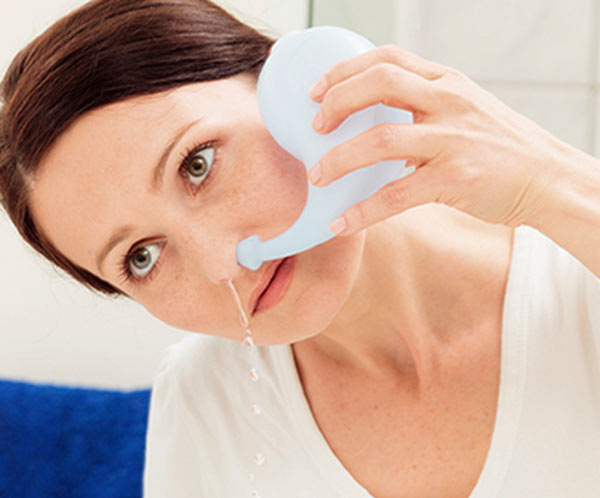Nasal and sinus irrigation is used to relieve nasal obstruction from congestion and other sinus symptoms of sinus disease. It is a homeopathic technique that flushes out clogged nasal passages and sinuses using a saltwater solution. Nasal irrigation is often recommended as a first line of treatment because it is safe, effective and well tolerated by most patients. When used in conjunction with other sinus treatments, nasal irrigation can help to maximize effectiveness and symptom relief.
Types of Nasal Irrigation
 There are several different options for nasal irrigation. The most common irrigation device is a Neti pot, which can be found at a local drugstore. It is a small pot that is filled with a saline solution and then manually poured through the nostrils. A blub syringe can also be used in a similar manner. Both methods are simple and effective. Higher tech irrigation systems propel saline solution into the nose and allow the user to control the spray and the pressure. These devices may help saline reach further into the sinuses, but typically cost more.
There are several different options for nasal irrigation. The most common irrigation device is a Neti pot, which can be found at a local drugstore. It is a small pot that is filled with a saline solution and then manually poured through the nostrils. A blub syringe can also be used in a similar manner. Both methods are simple and effective. Higher tech irrigation systems propel saline solution into the nose and allow the user to control the spray and the pressure. These devices may help saline reach further into the sinuses, but typically cost more.
Common Sinus Conditions Treated with Nasal Irrigation
Nasal irrigation can be used to treat or ease the symptoms of almost all sinus conditions. The benefits vary depending the individual, the severity of symptoms and the underlying cause of sinus problems.
- Allergies: Allergens inhaled through the nose can irritate and inflame the nasal passages. During nasal irrigation, the saltwater solution rinses out the allergens trapped in the nose and soothes the inflammation of the mucous membrane.
- Nasal obstructions: Nasal obstructions such as polyps and enlarged turbinates can prevent proper drainage from the nose and sinus cavities. With nasal irrigation, the saline solution thins the mucous allowing for better drainage.
- Chronic and acute sinusitis: Nasal irrigation can alleviate some symptoms of sinusitis by thinning the mucous trapped in the sinuses and making drainage easier. The saline rinse also helps to clear bacteria in the nose that leads to infection and reduces inflammation of the sinus lining that occurs with sinusitis.
Other Benefits of Nasal Irrigation
- Nasal irrigation is a safe method of managing sinus symptoms for both adults and children.
- The therapy can be done conveniently at home.
- The saline solution can restore moisture to dry nasal passages and soothe inflammation naturally.
- Use of nasal irrigation can reduce the need for medication in some patients.
- Nasal irrigation can compliment other sinus treatments to maximize results. By thinning mucous and clearing nasal passages, nasal irrigation helps medications such as steroid sprays to better reach into the passages and sinus cavities where they can be most effective.
- Surgeons may recommend using nasal irrigation following sinus surgery to clear crusting in the nasal passages.
The Process of Nasal Irrigation
 A saltwater solution is made either using a premeasured packet or by mixing 1-2 cups warm water (distilled or previously boiled) with ¼ – ½ teaspoon of iodine free salt and a pinch of baking soda (to soften the salt).
A saltwater solution is made either using a premeasured packet or by mixing 1-2 cups warm water (distilled or previously boiled) with ¼ – ½ teaspoon of iodine free salt and a pinch of baking soda (to soften the salt).
A nasal irrigation device such as a neti pot or bulb syringe is filled with the saline solution.
Leaning forward over the sink, the head should be tilted so that one nostril is pointed down.
While breathing through the mouth, the saline solution is poured into one nostril allowing the solution to run through the nasal passages and out the other nostril.
Depending on the severity of congestion, some solution may run into the mouth.
Head position can have an impact on the degree of delivery and the reach of the solution. For example, tilting the head forward can help the rinse to reach the upper nose and sinuses located in the forehead.
Gently blowing the nose can clear thinned mucous and remaining solution upon completion.
Nasal irrigation should be avoided when one side of the nose is completely blocked or when an ear infection present.
For some patients, irrigating the nose once or twice may alleviate symptoms. For those with chronic sinus issues, regular nasal irrigation (3 times a week) can significantly help to control symptoms and improve quality of life. If symptoms do not improve with nasal irrigation, an Ear, Nose and Throat Specialist should be consulted to diagnose underlying problems and recommend the appropriate treatment.
If you would like an appointment with one of our physicians at Fort Worth ENT & Sinus please complete an online appointment request or phone 817-332-8848.
Frequently Asked Questions
The frequency depends on your symptoms. For occasional congestion or allergies, once daily or a few times per week may be enough. Patients with chronic sinus issues often benefit from regular use (about 3 times per week). Overuse isn’t usually harmful, but daily long-term use should be discussed with a physician.
Yes, nasal irrigation is commonly used during both acute and chronic sinus infections. It helps thin mucus, improve drainage, and flush out irritants or bacteria. However, if symptoms worsen, severe facial pain develops, or fever persists, medical evaluation is recommended.
Nasal irrigation can be safe and effective for children when done properly and under adult supervision. Child-appropriate devices and gentle pressure should always be used. Parents should consult an ENT specialist before starting nasal irrigation in young children or infants.
Only distilled, sterile, or previously boiled and cooled water should be used. Tap water may contain microorganisms that are safe to swallow but unsafe for the nasal passages. Using the correct water type significantly reduces the risk of infection.
Most people tolerate nasal irrigation well. Mild side effects may include temporary ear fullness, nasal irritation, or a slight burning sensation if the salt concentration is incorrect. Using the proper saline ratio and gentle technique helps minimize discomfort.


